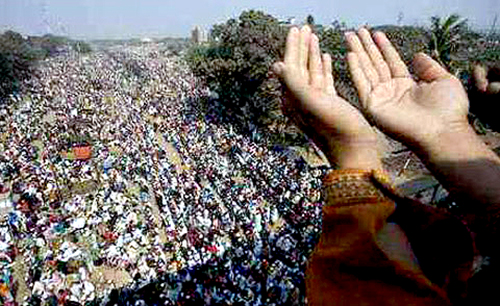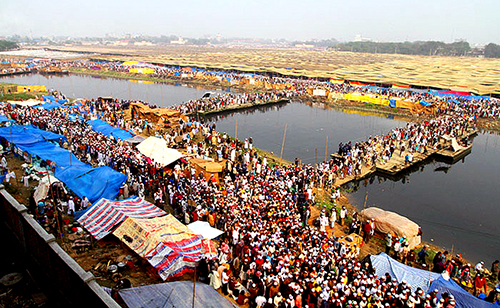Chittagong, Bangladesh: Over a million Muslim devotees raised their hands in prayer seeking forgiveness and blessings for the peace and prosperity of the Muslim Ummah during the first phase of Biswa Ijtema , the biggest annual Islamic event after hajj, which concluded on January 15 with the Akheri Munajat (concluding prayer), according to a religious teacher who participated in the concluding prayers.

Renowned Islamic scholar Moulana Zobayerul Hasan of India conducted the Munajat (prayer) on the bank of river Turag, at Tongi.
During the 20-minute prayer, Moulana Zobayer, the Imam of Delhi Mosque, sought divine intervention in protecting Islam and establishing its teachings in the hearts of all Muslims.
According to sources, thousands of Muslims prayed for peace and the prosperity of Muslim Ummah.
In his Munajat, both in Arabic and Urdu, Zobayer also prayed for the recovery of those suffering from diseases and for the purification of the souls of Muslims.
Serious traffic jams were created at Tongi, Savar, Airport Road and Dhaka-Mymensingh Road, as the devotees started returning home from the Ijtema grounds.
An unprecedented scenario was created as myriad of Muslim devotees raised their hands in a mass prayer seeking the mercy and forgiveness of Almighty Allah (God). Many devotees broke down in tears during the Akheri Munajat of the first phase of the 47th Biswa Ijtema.
President Zillur Rahman, Leader of the Opposition Khaleda Zia, Ministers and political leaders joined the Akheri Munajat (concluding prayers). Prime Minister Sheikh Hasina also joined the Munajat from Ganobhaban.
Devotees from 33 districts joined the prayers with thousands more on the nearby rooftops, open fields and roads.
Hundreds of devotees had to remain outdoors due to the lack of indoor space to accommodate the number of attendees.
"I am suffering especially due to the cold weather. But it doesn't bother me. I think I would be lucky if I die here," 70-year-old Kamaluddin Miah, who came from north-eastern district of Sylhet said.
“I attend this Ijtima for my personal purification and development,” said Mohammad Shakil (45), who came from Pakistan.
The huge gathering of devotees who joined the Munajat spilled over to areas around the Ijtema venue on the bank of the Turag at Tongi, 20 kms from the capital.
The first phase of three-day annual Islamic congregation began on last Friday, with the deliberation of ‘Aam Bayan’ or principal sermons after Fajr prayers.

About 17,000 foreign devotees from 80 countries, including the Kingdom Saudi Arabia, Oman, Egypt, U.A.E., Qatar, Australia, Brunei, Canada, Cambodia, Denmark, Finland, Germany, Iran, Japan, Madagascar, Mali, Mozambique, Nigeria, Panama, Senegal, South Africa, Tanzania, Trinidad, Russia, U.S.A., Zimbabwe, Belgium, Cameroon, China, Fiji, France, Indonesia, Italy, Kenya, Malaysia, Myanmar, New Zealand, Norway, Philippines, Singapore, Sri Lanka, Sweden, Thailand, Turkey, U.K., Korea, Algeria, Ethiopia, Iraq, Palestine, Kuwait, Morocco, Somalia, Syria, Tunisia, Yemen, Pakistan, Bahrain, Jordan, India, Pakistan and Sudan have attended the Ijtema (meeting), so far.
“The scholars delivered sermons on various aspects of Islam, especially Iman and Amal (following Islamic law) which were instantly interpreted into Bangla, English and a few other languages,” according to different sources who attended the Ijtema (meeting).
Tablig Jamaat has been organising the Biswa Ijtema since 1946, with the first one held at Kakrail Mosque, in the capital, in 1946. It has been organising the Biswa Ijtema in two phases since 2011.
The second phase of the three-day Ijtema will be held on January 20-22.
Biswa Ijtema has been taking place in Bangladesh since the 1960s, when it used to take place at Dhaka's Kakrail mosque. In 1948, it took place at the Haji Camp in the Eastern District of Chittagong, and shifted to the District of Narayanganj's Shiddhirganj in 1958. With a steady increase in the number of devotees attending, the Biswa Ijtema was shifted to the banks of Turag in Tongi in 1966 and has been taking place there ever since.


